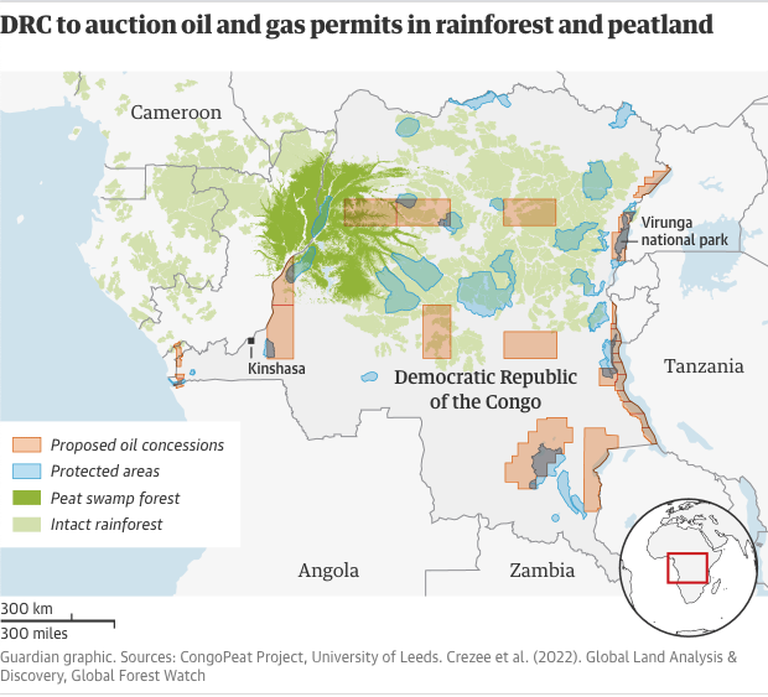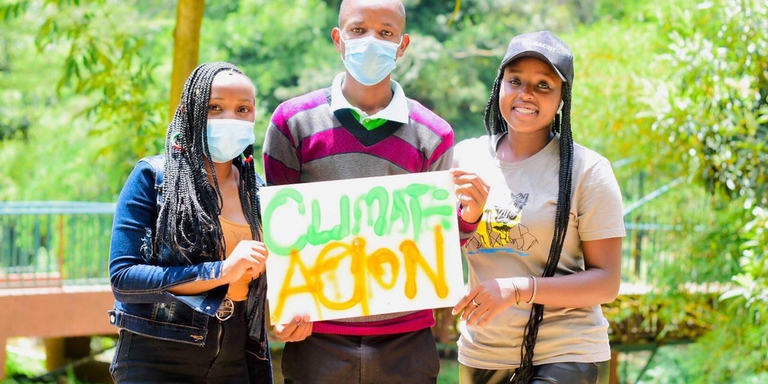
The climate impact of the U.S. Gulf of Mexico’s oil and gas production could be higher than government inventories indicate.
The Congolese government is allowing energy firms to bid for access to its vast oil and gas reserves, risking terrible ecological and climate effects.
The government of the Democratic Republic of Congo (DRC) has postponed the controversial auction of its 27 oil blocks and three gas blocks in the world’s second-largest protected rainforest, due to pressure from environmentalists. The oil blocks in question are spread over several parts of the country. Three are based in the coastal basin in the south of the country, nine in the Central Cuvette in the north-east of the DRC, eleven in the Tanganyika Graben in the east of the country, and four in the Albertine Graben, while the other three gas blocks are located in Lake Kivu in the west of the country.
Meanwhile, recent data has shown that the DRC has proven reserves of 180 million barrels, though estimates of total petroleum reserves are said to exceed 5 billion barrels. Currently, Congolese oil production is limited to the Coastal Basin, yielding 25,000 barrels per day of offshore production, all of which is exported.
Initially, the Congolese government had planned to auction 16 oil blocks out of the 27 to oil firms, but it appears that with the Russian-Ukrainian conflict war sharpening Western demands, the DRC has been prompted to act quickly and cash in on the increased global interest in fossil fuels. Didier Budimbu, the Congolese Minister of Hydrocarbons, during the tender announcement in July last year said that “the sale of all these oil blocks will bring in nearly $2 billion US dollars to our treasury. And in a context of international economic crisis marked by the war in Ukraine, the DRC can really develop thanks to this oil discovery.”
Despite acknowledging environmental concerns raised by environmental activists, Mr Budimbu is adamant that his country has a right to exploit its natural resources. “The people of our country have the right to benefit from our natural wealth. People must understand that we are a free, sovereign nation, so we will exploit our natural resources.” He stressed.
DRC Environment Minister Eve Bazaiba has also defended the fossil fuel bonanza. “Nobody can put pressure on us. No convention in the world, not even the Paris Agreement, forbids a country from emitting CO2 for development purposes. Those who think the oil blocks pose a problem should come and re-assess,” said Bazaiba. She further assured critics that an environmental impact assessment of oil drilling would be carried out prior to the auctioning of all oil blocks. “If we think it could destroy the environment, we will leave it in the ground.”
Initially, the DRC government had planned to unveil the list of multinational companies bidding for oil drilling in January this year. However, just before the deadline, minister Didier Budimbu tweeted that the cut-off points had been rolled back with immediate effect to various dates between April and October 2023.
Although the auctioning of 27 oil blocks has been postponed, new information has emerged that the Congolese government secretly auctioned off three gas blocks to the US and Canadian companies in the rainforest. Meanwhile, Mr Budimbu has declined to comment on the alleged auction, but he was quick to indicate that the “exploration there” would follow environmental guidelines.
Environmentalists and climate change activists have condemned the auction and looming oil drilling. Benard Kioko Ndaka, the CEO of Global Green Economy, said in an interview with LifeGate that “the planned auctioning of oil fields in the protected areas in DRC is a terrible embarrassment to the DRC’s efforts to position itself as a solutions country for the climate crisis. We’re urging the Congolese government to abandon current and future oil explorations in the protected areas. We believe that fossil fuels are a dead end.”
“The Congolese government must not only focus on financial or economic interests, but the lives of millions of people in Congolese communities and around the world that will be at stake,” Ndaka continued. “Let me end by saying this: there is no figure in terms of dollars that could compensate for the climate consequences. It’s not too late for the DRC to control the situation.”
Following backlash from environmentalists, a series of multinational oil giants have reportedly ruled themselves out of the controversial oil projects in the DRC. France’s TotalEnergies, one of the corporations at the tender event, said that it was not participating in the bidding and said other major players will likely stay away. So far, eleven companies have indicated they are not interested in bidding for the 27 oil blocks in the protected areas. Unfortunately, other multinationals such as Chevron, Tullow Oil, and Perenco have not publicly commented on whether they will bid or not.
Meanwhile, independent environmental campaigning organisation Greenpeace Africa, says it has kept records of public statements made by giant oil companies. It is clear that fossil fuels have built the modern world and brought us conveniences that we now take for granted, but in the 21st century, science now tells us that we need to move away from fossil fuels to prevent the worst effects of climate change.
Siamo anche su WhatsApp. Segui il canale ufficiale LifeGate per restare aggiornata, aggiornato sulle ultime notizie e sulle nostre attività.
![]()
Quest'opera è distribuita con Licenza Creative Commons Attribuzione - Non commerciale - Non opere derivate 4.0 Internazionale.
The climate impact of the U.S. Gulf of Mexico’s oil and gas production could be higher than government inventories indicate.
ReconAfrica hunt for oil and gas threatens vital waterways home to the world’s largest elephant population and endangered wildlife
Despite environmental warnings, the Tanzanian government is set to build a dam in the heart of the Selous Game Reserve, a UNESCO World Heritage site.
Researchers from the IFM at Deakin University in Victoria, Australia have tested a novel method for removing silicon from used solar panels.
The US government has approved ConocoPhillips’s controversial Willow Project to drill for oil in Alaska’s National Petroleum Reserve.
Environmental activists say the EACOP pipeline will damage Uganda’s iconic fragile ecosystem and the livelihoods of tens of thousands of people.
The EU has banned the sale of new petrol and diesel cars and vans from 2035. From then on, new cars and vans sold in the EU must run on other fuels.
Environmental activists have accused Eskom of emitting toxic chemicals that are costing thousands of lives and changing rainfall patterns.
While the world feels the impact of the climate crisis and millions of people struggle to heat their homes in the UK, oil companies post record profits.










